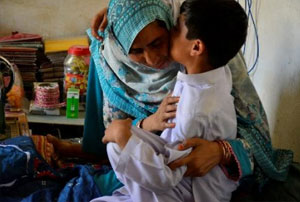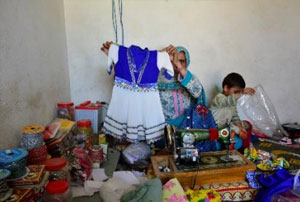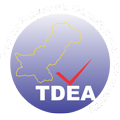“Every month people came knocking my door, asking for money I owed them. I had the tailoring skills, but I was not an efficient worker due to ongoing house chores and regular load shedding. Though I had developed a customer base, I had to turn away a majority of them as I could not manage their orders”, Maryam recalls her ordeal adding, “Due to hijab/purdah (veil), my husband did not allow me to work outside.”
Maryam, a 26-year-old young woman, heads a household, and stitches clothes for a living in Ahmedabad – a remote locality of Charsadda in Khyber Pakhtunkhwa (KP). Maryam had used a hand-driven stitching machine for tailoring as she could not afford an electric machine due to frequent power outages and higher power tariffs, which hinders her ability to optimize her work. Her working hours were practically confined to daytime. With ever-shrinking household income, piling up loans, a drug addict husband, and a sick son, Maryam’s clothes’ stitching was difficult. She had to display her own stitched dress which did not help her to get out of the vicious poverty trap.

Solar-powered stitching machine and lighting arrangements transformed her life. Tal Sparlay, with the support of USAID Ambassador’s Fund Grant Program, introduced an innovative solution for 100 low-income women-led households like that of Maryam, from remote villages of Tangi tehsil, in Charsadda. In order to supplement their incomes, the project provided each of these women with a solar-powered sewing machine, two LED bulbs and a fan along with a battery to store power for nocturnal use.
Tal Sparlay also identified six local electricians and converted their shops into facilitation centers for women beneficiaries. These electricians were trained in handling basic solar system design, repair, and maintenance issues and gender sensitization to deal with their female clients. These electricians and their kiosks are now serving the beneficiary women with the requisite technical support.
Within a month of working on the solar-powered sewing machine, Maryam was able to return the loan she had taken for her son’s successful surgery. “During Ramazan, I stitched 180 dresses and earned Rs. 54,000 (USD 360) in a single month. With the solar-powered sewing machine, I can complete more orders than I ever did with almost no power cost involved!”, says Maryam.

A comparison of the incomes before and after the intervention, shows that the income of the beneficiary women has increased up to Rs. 700–Rs. 800 (USD 5) in a single day, from their initial income of Rs. 350-400 (USD 2.5) a day. Moreover, because of solar power, their electricity bill was also reduced by Rs. 600–Rs. 900 (USD 4-6) per month.
Sitting next to her newly acquired solar-powered sewing machine, she sounds content and happy. With a hopeful attitude, Maryam says, “Once I pay off loans, I am planning to start clothes’ stitching classes in the evening for the girls in my village.”




















